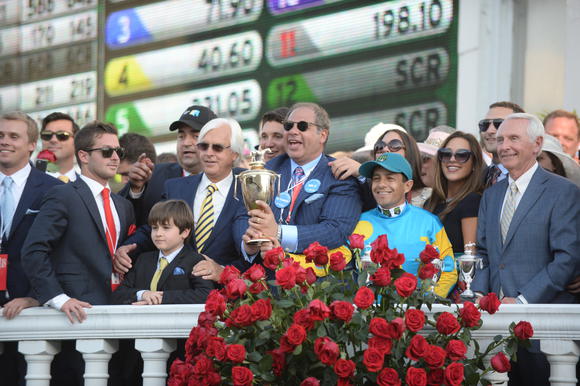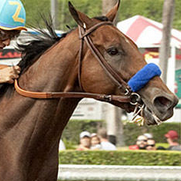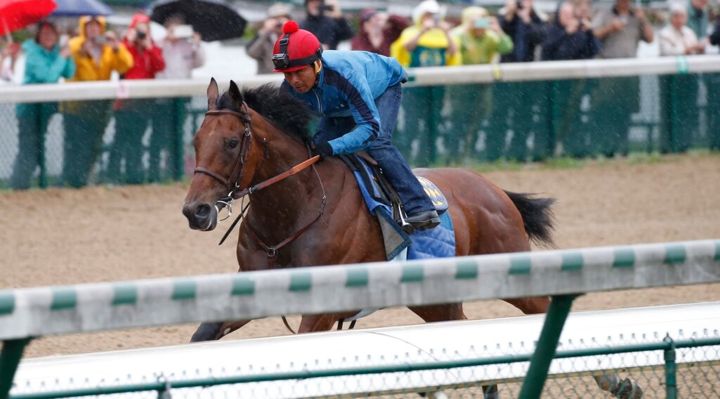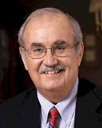
By Billy Reed
Special to NKyTribune
Even now, when the sport is long past its prime, thoroughbred racing can still put a grip on people’s hearts that no other game can. Did you hear that incredible roar that accompanied American Pharoah down the stretch at Belmont Park? When was the last time you ever saw so much unmitigated joy – laughter, tears, hugs – at a public event?
Pharoah was America’s horse on Saturday. Even those who bet against him seemed to do so reluctantly. An incredible 37 years had passed since Affirmed had become the sport’s 11th Triple Crown winner. Many felt the challenge of sweeping the Kentucky Derby, Preakness, and Belmont in five weeks had become impossible for today’s fragile thoroughbreds.

But American Pharoah completed the sweep in style, pulling away to a 5 ½-length victory in 2:26.65, the fastest winning time since 2001. Since Affirmed, he was the 14th colt to come to the Belmont with the Triple Crown on the line. But he was the first who had all the right stuff.
So the public was happy to see that the feat was still possible and that the long drought was over. But there was more, too. America’s love for horses goes back to the first time one man said to another, “I’ll bet my horse is faster than yours.” That’s about as simple and fundamental as competition gets. And it shouldn’t be forgotten that when the Triple Crown races first were held, automobiles hadn’t even been invented.
Let it be said that American’s Pharoah’s Belmont victory was the easiest of his Triple Crown triumphs, and that it was done in the most straightforward way possible. Just as was the case with Seattle Slew in his 1977 Belmont victory, the best horse went straight to the lead and dared the field to come get him.
Although Materiality tried to run with him in the early going, he faltered on the backstretch and fell back, eventually finishing last. In the turn for home, Mubtahhij tried to get through on the rail, but jockey Victor Espinoza deftly to close the home. And then, in the stretch, the closer Frosted came at him, just as everyone knew he would. But it was too little, too late.
In the last eighth of a mile, American Pharoah was all alone, a study in excellence. Away from the track, he’s a fairly docile horse who doesn’t mind being petted by strangers. But when it’s time to go to work, he becomes “a tremendous machine,” to borrow the phrase announcer Chic Anderson used to describe Secretariat’s breath-taking Belmont.
Although owner Ahmed Zayat said all the right things on the victory stand, he’s hardly the most likeable Triple Crown owner ever. For years, he has been in court defending himself against charges that he welshed on more than $1 million in gambling debts. Last week, when a judge threw the case out of court because the statue of limitations had expired, Zayat said it was a victory. Some people just don’t know when to shut up.
But you don’t have to like Zayat to like American Pharoah. His jockey, Victor Espinoza, is the first Hispanic rider to win the Triple Crown. He grew up poor in Mexico and used racing as his ticket to a better life. After yesterday’s victory, his smile was a beacon as daylight turned to dusk.
Happy as Espinoza was, trainer Bob Baffert was emotional in a different way. A few years ago, he suffered a near-fatal heart attack in Dubai. It seemed to change him dramatically. Once the life of the party, Baffert became more reflective and grateful. He was moved to tears yesterday when he said he talked to his late parents throughout the race.

After his Triple Crown in 1973, Secretariat was defeated twice at Saratoga, by Onion and Prove Out, both trained by the late Allen Jerkens. That hardly diminished the place he held in the public’s heart. After his final race, owner Penny Tweedy retired him to stud at Claiborne Farm instead of running him as a 4-year-old.
In 1977, the young owners of Seattle Slew got into an ugly squabble with trainer Billy Turner over what was best for the horse. Over Turner’s objections, they shipped him to Hollywood Park, where J.O. Tobin handed him the first loss of his career. The owners replaced Turner with Doug Peterson and ran Slew as a 4-year-old, where he only burnished his Triple Crown glory.
A year later, owner Louis Wolfson kept Affirmed in training. He won some big races in the fall of his 3-year-old year (there was no Breeders Cup then) and capped an outstanding 4-year-old campaign by beating Spectacular Bid, the 1979 Derby and Preakness winner, in the Jockey Club Gold Cup at Belmont.
Surely Zayat will continue to allow Baffert to call the shots for American Pharoah. Every major track in North America will be trying to get a piece of the new Triple Crown winner. As for his breeding career, it will be interesting to see when the owner decides to retire him.
When historians look back on Pharoah’s Triple Crown run, they will note that Espinoza had to whip him repeatedly down the stretch at Churchill Downs to get him a length ahead of Firing Line. At the Preakness, he overcame a sloppy track and the No. 1 post to win handily. At the Belmont, he turned in his best performance at the perfect time.
Although he gives racing a long-awaited superstar, he will not be the sport’s savior. As the euphoria ebbs, the problems will remain: Declining attendance, too much reliance on revenue from other forms of gambling, inconsistent drug policies, short fields, poor customer service, and so on.
And yet, as we saw yesterday, racing can still move people unlike any other sport. The challenge is to figure out how to tap into that love and energy more than three or four days a year.
The noise. Did you hear that noise? Didn’t your heart flutter just a bit at the magnificence of it all? American Pharoah proved more than that he belongs to be mentioned with the immortals. He proved there’s still a soft place in America’s heart for horse racing.
Billy Reed is a member of the U.S. Basketball Writers Hall of Fame, the Kentucky Journalism Hall of Fame, the Kentucky Athletic Hall of Fame and the Transylvania University Hall of Fame. He has been named Kentucky Sports Writer of the Year eight times and has won the Eclipse Award twice. Reed has written about a multitude of sports events for over four decades, but he is perhaps one of media’s most knowledgeable writers on the Kentucky Derby.


















